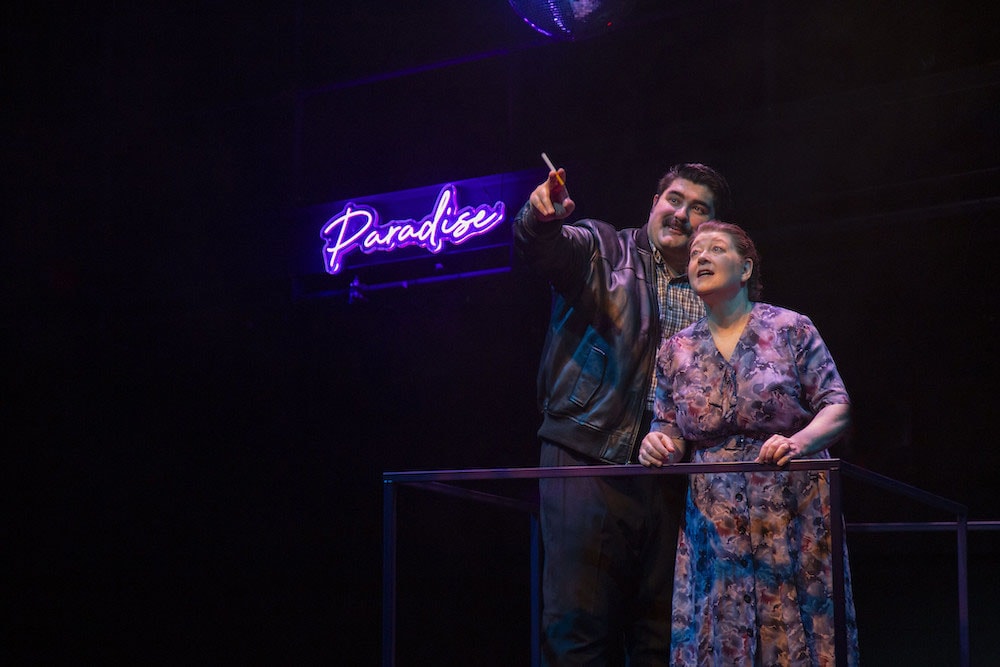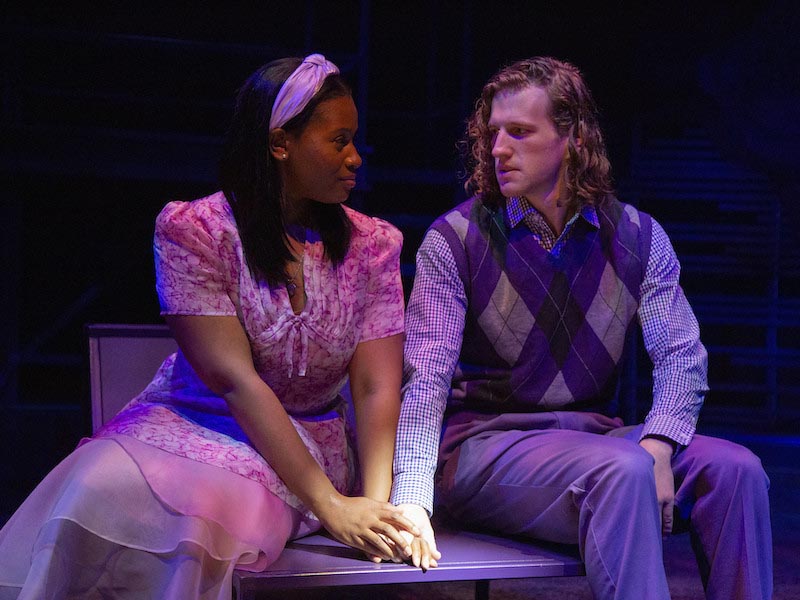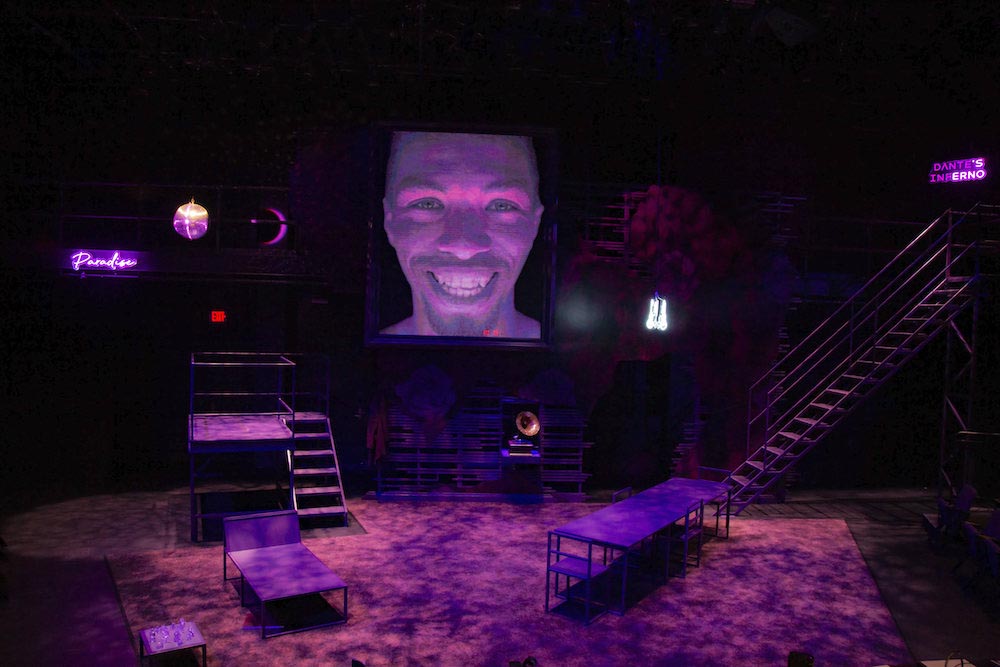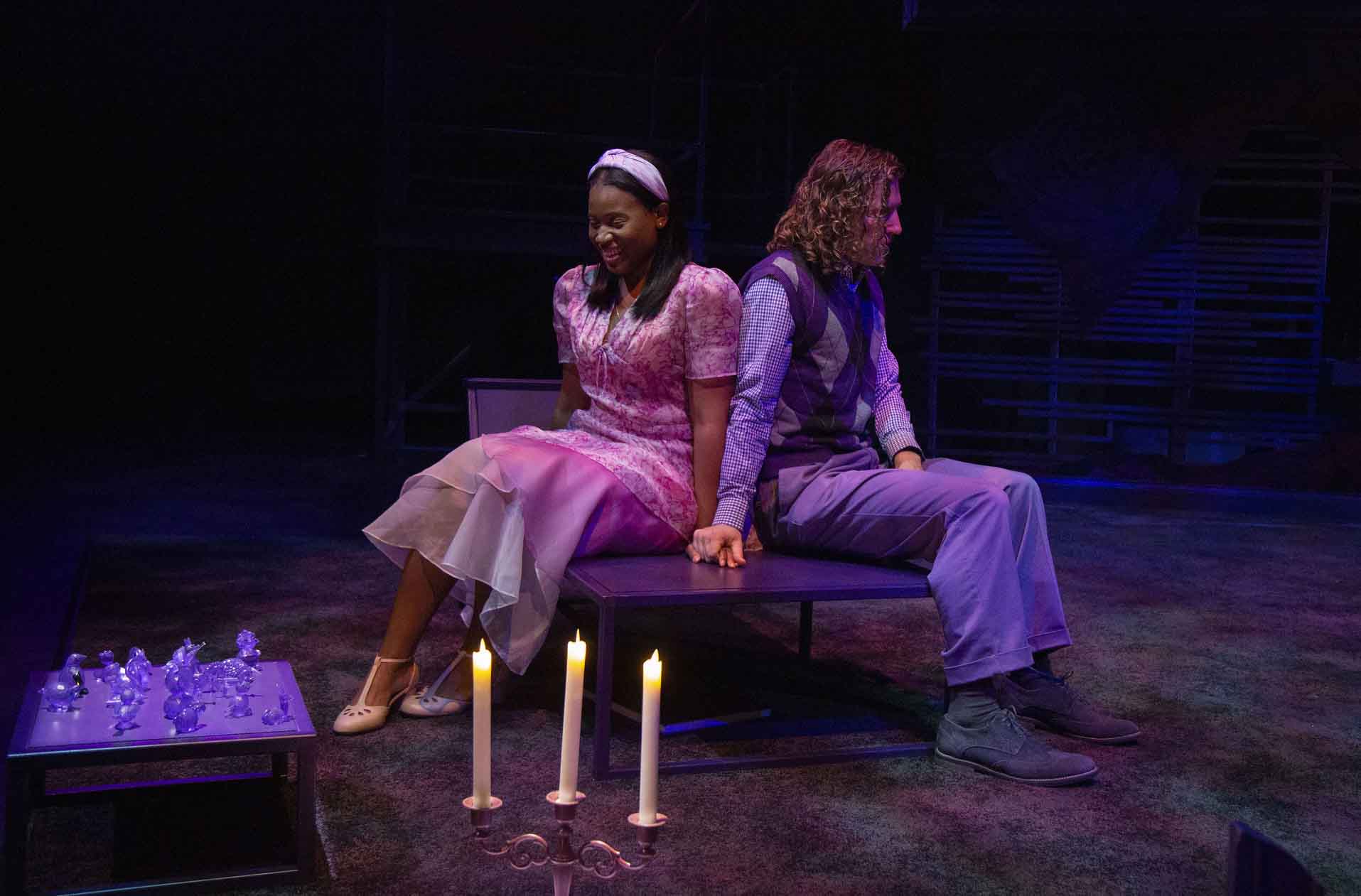Rep Stage, the professional regional theater company in residence at Howard Community College, is back with its first produced show since the P-word swept in and changed everything. Choosing Tennessee Williams’s The Glass Menagerie, the text of which unapologetically declares itself to be memoir, provides ample opportunity for reflection. Director Joseph W. Ritsch suggests a fresh take on what it means to remember.
While people who write about Tennessee Williams and The Glass Menagerie often refer to it (and other early Tennessee Williams dramas) as “seminal work,” they rarely explain that “seminal” means influential on what comes into existence after it. In this case, Williams’s “modified realism,” despite being loaded with Southern Gothic archetypes, paved the way for later playwrights to feature real people having mundane conversations with contemporary cadences, repetition, discord, and overlapping and non-verbals. Even so, Williams’s work is musical, rhythmic, and (ideally) full of tautly elongated silences.

Director Joseph Ritsch chooses excellent cast members who resonate with the rhythm and music of the dialogue, but in many places he rushes them through it, making it feel cramped and small. The dialogue-free moments are wedged into unintuitive spots. He injects some unsubtle variations to the play, which suggest more complicated motivation than the words of the script strictly do, but the variations neither change the trajectory of the plot nor enrich it particularly. Both Ritsch and Dramaturg Khalid Long make assertions in their program notes about conceptual casting adding depth to the play’s themes. I love inclusive casting but with no other changes, it does not convey to me any additional information or depth. I expect inclusive casting nowadays, and “conceptual casting” would not have occurred to me had it not been explicitly mentioned.
Playing Thomas Wingfield, a stylized manifestation of Williams himself, Dylan Arredondo imbues Tom with humor, vulnerability, bombast, and a wry embarrassed fondness of his remembered self. Arredondo, as Tom, makes genuine connections with the other characters, is tenderly protective of his sister, conspiratorial with his co-worker, and even gently teasing with his mother in a particular sequence. Arredondo clearly understood what Tennessee Williams wished us, the audience, to know: that Tom and Amanda’s relationship was not exclusively, perpetually contentious. He’s listed in the program not by his character’s name, but by his familial position, The Son.
As Amanda Wingfield (or, as the program identifies her, The Mother), Grace Bauer is sharp, strident, and relentless. Her emotive vocal modulation is delicate and precise, aligned perfectly with the emotions of each scene. Bauer’s interactions as Amanda with the other characters strain toward connection, even while Amanda remains irrevocably trapped by her own erroneous narrative. Grace Bauer did better than do justice to Amanda Wingfield — she gives the audience reason to wonder: Is she two-dimensional, or is Tom’s memory of her flat?

As Laura, The Daughter, Brittany Davis shines like a firefly in a Mason jar, more or less happily inhabiting her little world, uncomfortable with expanding her boundaries, and coming to animated life only when speaking of the things that delight her. Davis’s nervous tics are idiosyncratic and heart-wrenching; her enaction of Laura’s moments of brief courage, applause-worthy; and her embodiment of Laura’s disappointment, a personal injury to every member of the audience. I’m intimately familiar with The Glass Menagerie, and I was choked up anyway, which is a credit to Brittany Davis. Is Laura overly idealized? Of course she is. That’s kind of the point.
In the role of The Gentleman Caller — who has a name: it’s Jim — Noah Israel injects chaotic wild-card energy into the family dynamic. As fraught as the familial interactions are in Act I, they are somehow familiar and not necessarily alarming. We can sense patterns in them. Jim, who arrives midway into Act II, represents the Unknown, and as such, Israel plays his character and dialogue at extreme levels. He shifts moods suddenly and thoroughly and even his hair is expressive. Is he a caricature? Perhaps; this is Tom’s memory.

The interior of the Horowitz Arts Center at Howard Community College is standard industrial education architecture. The modular seating of the Black Box theater offers adaptability, but the interior is exactly a black box. Scenic Designer Mollie Singer creates a multi-leveled playing space devoid of color but for a projection screen and neon signage outside the home of the Wingfield family. One of the projections is a portrait of “That boy! That grin!” The man who stole Amanda Wingfield’s heart, then abandoned his family, looms large and ever-present in their lives despite — or perhaps because of — his absence.
Lighting Designer Martha Mountain’s light plot and projections are carefully conceived, additive and amplifying, and perfectly executed. There is use of a disco ball and smog during the show.
The quality and precision of the audio elements in the performance are impeccable. Sound Designer Sarah O’Halloran creates a rich audio environment that helps fill in the sparseness of the observable set.

Please be aware that the next paragraph contains potentially disturbing information, but also valuable insight into the motivation of the playwright.
It’s fairly well known that Tennessee — born Thomas — Williams was, in writing The Glass Menagerie, working out his guilt over abandoning his sister in 1938 to begin his writing career in California. This doesn’t have much emotional traction unless you know that in his absence, in early 1943, their mother Edwina Williams had Rose lobotomized for “schizoid behavior,” and informed her son of the procedure only afterward, by letter. Which explains his fairly obvious fury at his mother. Rose, who lived to age 86, 13 years after her brother Tennessee’s death, spent the rest of her long life institutionalized.
Running Time: Just under two hours, including one 15-minute intermission.
The Glass Menagerie plays through May 15, 2022, presented by Rep Stage performing in the Rouse Company Foundation Studio Theatre at the Horowitz Visual and Performing Arts Center on the Howard Community College campus, 10901 Little Patuxent Parkway, Columbia, MD. Tickets are available online and are $40 for general admission, $35 for seniors and military, $15 for students with a current ID, and $20 on Thursdays. For tickets and additional information, visit repstage.org or call the Horowitz Center Box Office at 443-518-1500 ext. 0. The box office is open Wednesdays through Fridays, 12 noon to 4 p.m. and 90 minutes prior to performance times.
Parking is available in a garage directly across from the Horowitz Center. There’s nongarage parking also in nearby lots.
COVID Safety: Masks are recommended but not required.
CAST
Dylan Arredondo as Tom
Grace Bauer as Amanda
Brittany Davis as Laura
Noah Israel as Gentleman Caller
ARTISTIC TEAM
Director: Joseph W. Ritsch
Scenic & Props Design: Mollie Singer
Sound Design: Sarah O’Halloran
Lighting Design: Martha Mountain
Costume Design: Julie Potter
Stage Manager: Ricky Ramón
SEE ALSO:
Rep Stage looks at ‘Glass Menagerie’ through a mixed-race lens (interview feature by John Stoltenberg)




